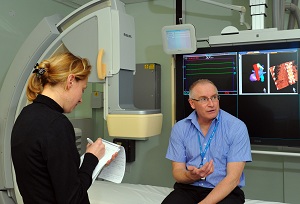
Andy Rogers, Medical Physicist, has taken on the brand new role of BIR Vice-President for External Affairs. Find out about his plans for this new role, why he’s passionate about medical physics and something you might be surprised to learn about him:
What are your plans in your new role at the BIR?
As Vice-President for External Affairs I have quickly realised the enormous undertaking that I have taken on, given that “external affairs” encompasses almost anything I want it to! However, apart from wanting the BIR to rule the world, the first area to get right is the ability of BIR to respond to external media queries and thus raise our public and professional profile—this means putting in place a body of experts who are both media trained and willing to respond in the timescale required by today’s fast-moving news agenda. Equally important will be our ability to influence healthcare policy; to that end, we need to work closely with all our sister organisations. To help with all this work, I will be appointing members to specific support roles and forming an External Affairs Committee to ensure a coherent BIR approach.
What will be the biggest challenge for you?
The biggest challenge will be to ensure that a small organisation like the BIR can achieve its laudable goals across a broad front without losing effectiveness. Luckily, the BIR is made up of the most talented, dynamic bunch of people that I have ever met and so I feel challenged but not daunted by the task ahead—if you’re reading this then you’re in my sights!
In your opinion, what are the burning issues in the world of radiology and imaging at the current time?
Carrying on from the theme above, I think I would like to see a broader collaboration between radiological/imaging professional bodies to influence the worldwide agenda. Just in my small sphere of radiation physics I see developments in technology and standards that impact upon the UK with almost zero input from the UK, which I feel is a waste of our talent pool. We need to get out there and join in, although time and funding seem perennial issues to overcome—maybe by spreading that cost across multiple organisations the UK could sponsor experts to speak on all our behalves?
Why did you originally join the BIR?
It is that long ago that I truly cannot remember; however, I do remember that as soon as I sat on my first BIR Committee I knew it wasn’t a mistake!
Why would you encourage your team to join too?
The best thing about the BIR is the opportunity to engage and work with other medical/clinical groups, i.e. its multidisciplinary membership. This brings a rounded sense to its policies and pronouncements that I feel is unique. Now, with the advent of special interest groups (SIGs) and the new website, the opportunities for members to engage with each other are greater than ever before—so I would encourage them all to join and pick at least two SIGs to be active in. Get out there and join in!
What attracted you to a career in medical physics?
To be honest I didn’t know much about medical physics before I joined. I was a post-doctoral researcher in the Physics Department at Warwick University and, essentially, I needed a job and New Scientist used to have loads of adverts for something called a “medical physicist”. I visited the local hospital’s Medical Physics Department (thank you to my now-retired hosts at Walsgrave Hospital who changed my career direction), where I was showed the incredible variety of the role. A few job applications later, King’s College Hospital emerged as the most desperate to fill a vacancy and the rest, as they say, is history!
Which three scientists would you like to spend an evening with and why?
This is a nasty “let’s see how pretentious Andy can be” trap where I say something like “Charles Darwin” because he changed humanity! Well actually I only want an evening with scientists who have a sense of humour, can tell a story and get their round in!
What would be your advice to a young person starting out as a medical physicist?
That’s easy—engage with your non-medical physics colleagues, follow your good ideas through and develop your craft, and most importantly, have fun—everything else will take care of itself.
What's the best/worst thing to happen since you started working with BIR?
Best—joining the Radiation Protection Committee under Dr Bobby Corbett: more of a debating forum than a boring committee. Worst—realizing that as Vice-President for External Affairs I was expected to engage with social media—yuck! I still feel a twit when I tweet!
What might we be surprised to know about you?
People who know me tend never to be surprised by anything I might do or not do. However, I suspect that most people would be surprised to know that I really like contemporary art.
When you are not working, how do you like to spend your time?
I always wanted to be a professional sportsman, so I still spend some time watching cricket and football. I manage to sometimes get my creaking body on a mountain bike (but I can’t keep up with my sons anymore) and I love to drive single-seat racing cars around Donnington Park whenever I get the chance. My unfulfilled ambition is to get my pilot’s licence.
Which actor would play you in the film about your life?
Another “pretentious” trap? OK, Nicholas Cage (Leaving Las Vegas).